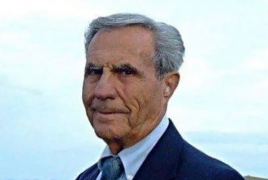
Former Utah Senator Bill Barton says in a fresh article published on The Spectrum that the U.S. state must recognize the integrity and independence of the people of Artsakh (Nagorno Karabakh).
“Two years ago, Utah’s Senate allowed the consul general of a brutal dictatorship to lecture our state on tolerance. February marks the 30th anniversary of dictatorial Azerbaijan’s first pogrom – a government-approved massacre – against its Armenian citizens. It is imperative for Utahns to know this history, which sparked the dusk of the Soviet Union, so that we are never again manipulated by lavish lobbyists’ lies,” the former lawmaker said.
“The year was June of 1987 when President Ronald Reagan stood in West Berlin and challenged Soviet Leader Gorbachev to “tear down this wall!” His words were a reminder to the world that the U.S. was and would continue to be the beacon of hope for so many trapped behind the Iron Curtain.
“Just eight months after President Reagan’s speech, Armenians who lived in the region known then as Nagorno Karabakh, voted overwhelmingly to reverse the Stalin-imposed borders that had placed the indigenous Christian minority within the predominantly-Muslim Azerbaijan and to reunite with their Armenian countrymen next door.
“The cry for freedom was met with tyranny. In major cities across Azerbaijan, Armenians were targeted for brutalities. Thirty years ago, the Soviet authorities incited an assault in Sumgait then stood idle as Armenians were gangraped, burned, and killed, followed by additional anti-Armenian massacres in Kirovabad, Baku, and Shahumyan. Dean Cain’s and Montel Williams’ documentary, Architects of Denial, features gruesome details of Azerbaijan’s anti-Armenian atrocities.”
After Soviet Azerbaijan brutally expelled all 300,000 Armenians outside Karabakh, the region’s indigenous Armenians fought to avoid genocide. The resulting 1990s war was the bloodiest of the post-USSR era. It victimized both Armenians and Azerbaijanis: 30,000 lives, a million refugees, and six years later, the Armenians emerged as victors by declaring an independent state known as the Nagorno Karabakh Republic (NKR) and as Artsakh to its native people.
“If this conflict is unfamiliar to you, you are not alone. This war was fought in the shadow of momentous global events. Nations were emerging and changing their flags faster than National Geographic was able to produce updated maps. There was no public internet to look up and see where Lithuania, Ukraine, Armenia or Azerbaijan was, let alone Nagorno Karabakh,” Barton says.
“Today’s technology enables us to follow world news closely. So when Azeri forces launched an offensive, which violated the ceasefire, in April 2016, everyone who seemed to care knew about it. The Armenian forces of Artsakh repelled the Azeris. Despite significant losses, Armenians held their ground, once again defending their rugged homeland. This time the world would surely condemn Azerbaijan’s unprovoked aggression and war crimes!
“If it were just that simple. Today, just like 30 years ago in Sumgait, most of the world stands idly by as Azerbaijan – a nation run by a petroleum-enriched dictatorship – buys lobbyist and influence in our nation’s halls of power and tries to infiltrate state capitols. No wonder that Azerbaijan’s 2016 war crimes against Armenian Christians – mutilation of elderly civilians and beheadings of soldiers – were only reported by Breitbart.
“Americans must always stand with people who are willing to fight for their right to life, liberty and the pursuit of happiness in their homeland. We must recognize the integrity and independence of the people of Artsakh and promise that America will not soon forget their sacrifices for the hard-fought independence. We owe this to everyone who lived in fear in the USSR; to everyone who heard President Reagan’s words and were inspired to throw off the shackles of oppression and tyranny. We owe it to the Armenians in Artsakh.
“Seven states have already recognized the Republic of Artsakh through legislative resolutions. We should be next.”
Bill Barton, whose maternal family survived the Armenian Genocide of the early 1900s, is a native West Valley resident and served 12 years in the Utah Senate.

